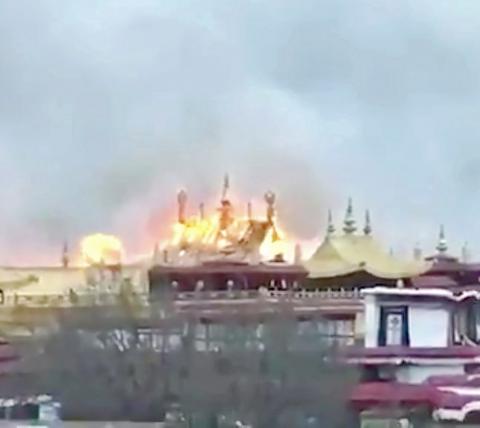A fire broke out on Saturday at one of the most sacred sites for Tibetan Buddhism, Lhasa’s revered Jokhang monastery, state media said, but no casualties were reported and the extent of the damage remained unclear.
Xinhua news agency said the fire began at 6:40pm, but was soon put out at the UNESCO World Heritage Site, which has more than 1,300 years of history and lies at the heart of old Lhasa.
Video and images posted on social media of the blaze showed the roof of a section of the building lit with roaring yellow flames and emitting a haze of smoke.

Photo: Screengrab from Twitter
“The fire was quickly extinguished; there were no casualties and order is normal in the area,” the state-run Tibet Daily said, adding that Tibet’s Chinese Communist Party Secretary Wu Yingjie (吳英杰) had rushed to the scene.
The cause of the fire was not immediately known.
Early reports of the blaze in Chinese state-run media did not give details and many social media posts discussing the fire appeared to be quickly censored.
Robert Barnett, a London-based expert on contemporary Tibet, told the Guardian newspaper that Beijing’s “almost total suppression of information” about the incident meant many Tibetans feared “the heart of Tibetan Buddhism” had suffered significant damage.
He also tweeted that sources in Lhasa “claim police have threatened anyone distributing pictures or unofficial news about the fire.”
For almost four hours after the fire began, it was not even acknowledged by China’s heavily controlled media, “even though you could see it from miles away across the whole city,” he said.
“This has increased the fear of people that something really serious has happened,” Barnett said. “People are hugely concerned, rightly or wrongly, that the damage might be much more severe than the media is letting on.”
The blaze comes as Tibetans across the country are celebrating Losar, the traditional Tibetan New Year that began on Friday.
The temple, an important pilgrimage site, had been closed to the public on Saturday, Xinhua reported, citing a schedule from local authorities from before the holiday began.
Jokhang houses one of Tibetan Buddhism’s most venerated icons — the Jowo Shakyamuni, a statue believed to be one of just three crafted during Buddha’s actual lifetime, depicting him at age 12.
It is also home to numerous other priceless cultural artifacts, including more than 3,000 images of Buddhas, deities and historical figures as well as treasures and manuscripts, according to UNESCO.
China’s efforts to control the narrative surrounding the fire underscores the Jokhang’s huge political as well as religious significance.
In recent decades the 2.5 hectare complex has been the site of repeated protests against Chinese rule.
As images of the conflagration spread on Saturday. Barnett said he received calls from distraught Tibetans mourning the apparent destruction of one of their most sacred sites.
Barnett said China’s bid to suppress news of the blaze would further hurt relations with Tibetans.
“It has restimulated the dominant tone in Tibet … which is intimidation really,” he said.
Foreign journalists are banned from visiting Tibet except on state-sponsored tours.
Additional reporting by the Guardian and AP

The CIA has a message for Chinese government officials worried about their place in Chinese President Xi Jinping’s (習近平) government: Come work with us. The agency released two Mandarin-language videos on social media on Thursday inviting disgruntled officials to contact the CIA. The recruitment videos posted on YouTube and X racked up more than 5 million views combined in their first day. The outreach comes as CIA Director John Ratcliffe has vowed to boost the agency’s use of intelligence from human sources and its focus on China, which has recently targeted US officials with its own espionage operations. The videos are “aimed at

STEADFAST FRIEND: The bills encourage increased Taiwan-US engagement and address China’s distortion of UN Resolution 2758 to isolate Taiwan internationally The Presidential Office yesterday thanked the US House of Representatives for unanimously passing two Taiwan-related bills highlighting its solid support for Taiwan’s democracy and global participation, and for deepening bilateral relations. One of the bills, the Taiwan Assurance Implementation Act, requires the US Department of State to periodically review its guidelines for engagement with Taiwan, and report to the US Congress on the guidelines and plans to lift self-imposed limitations on US-Taiwan engagement. The other bill is the Taiwan International Solidarity Act, which clarifies that UN Resolution 2758 does not address the issue of the representation of Taiwan or its people in

DEFENDING DEMOCRACY: Taiwan shares the same values as those that fought in WWII, and nations must unite to halt the expansion of a new authoritarian bloc, Lai said The government yesterday held a commemoration ceremony for Victory in Europe (V-E) Day, joining the rest of the world for the first time to mark the anniversary of the end of World War II in Europe. Taiwan honoring V-E Day signifies “our growing connections with the international community,” President William Lai (賴清德) said at a reception in Taipei on the 80th anniversary of V-E Day. One of the major lessons of World War II is that “authoritarianism and aggression lead only to slaughter, tragedy and greater inequality,” Lai said. Even more importantly, the war also taught people that “those who cherish peace cannot

US Indo-Pacific Commander Admiral Samuel Paparo on Friday expressed concern over the rate at which China is diversifying its military exercises, the Financial Times (FT) reported on Saturday. “The rates of change on the depth and breadth of their exercises is the one non-linear effect that I’ve seen in the last year that wakes me up at night or keeps me up at night,” Paparo was quoted by FT as saying while attending the annual Sedona Forum at the McCain Institute in Arizona. Paparo also expressed concern over the speed with which China was expanding its military. While the US